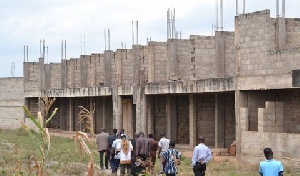A proposed market complex at Mamponteng, in the Kwabre East District of the Ashanti Region, awarded at a cost of about GH¢8.8 million in 2012, will now need a little over GH¢20 million for its completion, after work was abandoned six months into its construction.
The contractor working on the project, which has stalled for the past five years, is said to have been forced out of work due to excessive delays in the release of funds by the government towards the project.
Although the main source of funding for the project is unclear, the Public Interest and Accountability Committee (PIAC) reports that GH¢4 million from oil revenue was released to the project in 2012.
This amount remains the only funds released for the project since it started, although there is no documentary evidence at the district level to confirm its receipt.
So far, the total value of payments certified, excluding fluctuating amounts, to the contractors, according to a document available at the Kwabre East District Assembly is GH¢2,866,569.80. This amount is about one million Ghana cedis less of the oil revenue contribution that was said to have been released to the project.
While the project has grinded to a halt and is rapidly weakening, the provisional market which used to be at the same place the project is being constructed has since been relocated under high-tension power poles, which poses a grave danger to the lives of the market women and residents of Mamponteng who patronise the market.
The Kwabre East District Chief Executive, Nana Osei Assibey Bonsu, said that the situation is worrying and called for immediate government intervention.
He explained that the estimated GH¢20 million required to finish the project is even likely to go up significantly since that assessment was carried out in 2015.
The DCE said he is even struggling to identify the funding agency for the project, adding that the lack involvement of local authorities in projects awarded from the central government impede efforts to monitor work being done.
“It is a serious thing, and there is the need for a radical change in this approach. The Assemblies should be on notice to play their supervisory role in the execution of such projects effectively,” he decried.
Whilst conducting members of PIAC and the Institute of Financial and Economic Journalists (IFEJ), around oil funded projects in the region, the DCE called for a paradigm shift, where beneficiary communities are put directly in charge of such projects.
A leading member of PIAC, Dr. Steve Manteaw, supported the call, saying lack of involvement of sub-national structures in the execution of oil funded projects appears to be a common concern across the country.
“This is not good enough for ensuring efficient delivery of projects and services funded with oil money. What this leads to is poor supervision and therefore poor execution of projects,” he stated.
He noted that PIAC will make it part of its recommendations to government to consider including local authorities and beneficiaries not only in the selection of the projects but their monitoring and supervision.
He also identified that the seeming lack of appreciation of the benefits from the oil revenue by many Ghanaians is as result of the lack of public awareness of the existence of such projects, which are also not labeled to reflect their source of funding.
‘There is also the problem associated with the co-mingling of funds for the execution of particular projects. We’ve seen instances where, for instance, oil revenue has been co-mingled with GETFund resources and you find that the signage of the instances of this nature reflects the source of funding as coming from the GETFund.”
Dr. Manteaw said when this happens people do not get to know or appreciate that at least they are benefitting from the oil resources.
He, therefore, advised that when funds are co-mingled with oil money to execute any project, the oil component should also be acknowledged to have been part of the financing of the project.
Business News of Wednesday, 30 August 2017
Source: thebftonline.com













